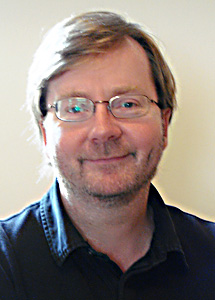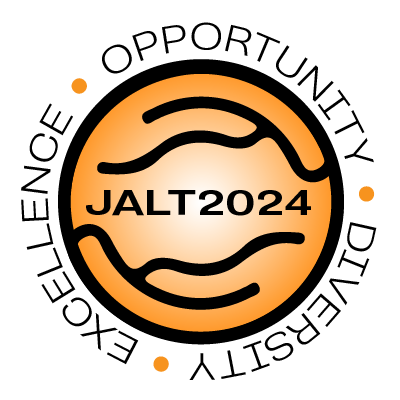A Writer's Journey
by MW-SIG 2014 Featured Speaker Miles Craven

Background
I became an English language teacher by accident. After leaving university in1988 I went to Rome on holiday and decided to stay, getting a teaching job in a language school. I’ve remained in ELT ever since, teaching students from all over the world, living and working in Portugal, Spain, Italy, Hong Kong, Japan and the UK. I love the wide variety of opportunities there are in ELT, both to travel, teach and to learn.
My first job was at Berlitz, in Rome. I still remember the German words and phrases they used to train the new teachers in their drill method. I loved Rome, and found I enjoyed teaching too. Over the years I have worked as a teacher, teacher-trainer, lecturer and materials writer. I’ve taught students of all ages from five to adult, all abilities from beginner to mastery, and almost every nationality. I’ve worked in private language schools, universities, and British Council centres. I’ve taught one-to-one, small groups and large groups. There were nearly 100 students in the largest class I’ve ever had (a writing class, believe it or not!). I’ve been an examiner and trainer for the Cambridge exams, IELTS, ARELS, SEFIC and LCC, as well as item writer for various national and international tests. I have been an ESOL examiner for Trinity Examinations, and most recently – for the last 4 years in fact – I have immersed myself in TOEIC… which has been more pleasurable than it sounds, I have to say.
I’ve always enjoyed materials writing. My first proper ‘book’ was published by Macmillan LanguageHouse in Japan, called Destination USA (1999). Looking back, it wasn’t really anything special, but it got me started. Importantly, it helped me get a foot in the door at Macmillan Education (the international parent company), and I was fortunate to then move on to co-author my first big course Get Real! You may remember this course, and if you are interested in more details, see here.
Get Real! took a couple of years to complete and originally came out in 2001. It proved very popular in Japan, Taiwan and Korea (especially levels 1 and 2) and there was a new edition in 2007. Even now, many years on, it still sells in Japan to some stalwart supporters! You can watch me explaining the benefits on a video. I loathe seeing myself or hearing my voice, and think I look awful on video, but anyway… it has some info. Also in 2000 I worked on Key Words for Business People, a self-study book for sale only in Japan through Nova. Nowadays, this is out of print since the demise of the Nova group and its publishing arm, but the concept was good and I might revive this phrase-led approach at some point. It is a very useful bilingual approach for self-study learners.
After Get Real! came out, I stopped teaching and started to write full time. Reading Keys followed in 2003, also for Macmillan. This is sold in many regions, so you can see the Japan MLH site here and also the international site. You can see this also had a new edition, in 2009. I am not surprised it has proved popular – mainly because I enjoyed writing the units so much. I took a content-based approach (so, starting with an interesting topic and working a unit around it) and putting key reading and vocabulary skills through it just felt right. The guiding principle is ‘if it feels right, it is’ and if you are enjoying what you are doing at the same time, then so much the better.
Also around this time I started writing for CUP. First came English Grammar in Use CD-ROM for the 3rd edition (now the 4th edition) which was a huge challenge but a very enjoyable one. I certainly learnt a lot about grammar! Then came two photocopiable resource books; Listening Extra and Quizzes, Questionnaires and Puzzles. Afterwards I helped with one level of a secondary course called Messages, before writing three levels of Cambridge English Skills – Listening and Speaking. You can find out about all these courses here.
In 2006 World Interviews came out with Seibido (who I respect a lot as a Japanese publisher committed to quality books). For this project, I interviewed students from around the world on a series of topics and turned their responses into an intermediate-level textbook. It was great to meet so many people, and it was refreshing to get so many genuine perspectives from young people I interviewed. Details are here. I am planning on writing a ‘sister’ book this year.
Writing can be stressful, but working on two courses at the same time takes this pressure to a different level. I was already working on Breakthrough, for Macmillan, when I had to start on Cambridge English Skills. This was a very demanding year and meant I had to work through the night many times to meet deadlines. I wouldn’t recommend it!
Anyway, Breakthrough came out in 2008, and had a new edition recently Breakthrough Plus. I think Macmillan have done a great job on this. As well as revising some content and adding videos, I had to write a new level, for beginner students. This was a real challenge and one I enjoyed a great deal. I think writing for beginners is the hardest thing to do, which is why I liked it so much. I also enjoyed updating and improving the course, introducing things like a 'flash mob' event as a listening exercise, and running a skills syllabus through all the levels. There are videos, a digibook with lots of tests and extra materials, and a great new design. It’s here, on MLH’s website: and also on the Macmillan English international site: The videos are great, and I have to say a big thanks to Todd Rucynski for these. I used to work with him at Nichidai way back. He’s a very talented guy and has a flair for bringing good quality video to ELT.
I worked on the Q series for OUP. You can never be bored as an ELT writer – the challenge is always different, and always keeps me interested. However, it can be frustrating … .
My latest project is Pass the TOEIC Test. This time, I decided to publish this myself rather than go through a publisher. It’s meant a huge learning curve, a vast amount of work … not to mention expense. But, you can’t stand still. The landscape is changing for ELT writers, certainly for international courses, and taking things forward in this way makes the most sense to me. In Japan, Nellie’s distribute the course. This is featured on the IPI website: as well as on the Nellie’s site. Seibido have brought out a bilingual version of the Introductory Course, aimed at teachers who prefer the book in a shorter format and with Japanese language support. This is called Valuable Clues to the TOEIC Test (a title I loathe), and you can find details here.
Actually, the course has its own website, and a second website for free online tests and materials. We now have partners in all the main TOEIC markets Japan, Korea, Taiwan, Thailand, France, and Latin America. I have just come back from a fourth Frankfurt Book Fair, and feel more at the heart of things than ever before. In France, Larousse have published the Intermediate Course under the Harrap's logo here.
Finally, just to round off, I did an interview with Darren Elliot a while back, in which he asked about my materials writing approach.
At the moment, my wife and I are getting ready for a 6-month trip to Japan. We arrive in November in time for JALT, and are both really looking forward to it. I used to live in Japan and try to return at least once a year. If you plan to do some writing, and want help or advice, then I really look forward to meeting you either at JALT or get in touch via the MW-SIG.
Good luck!
Miles

